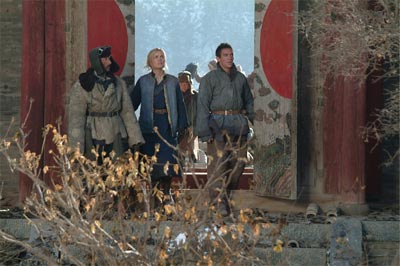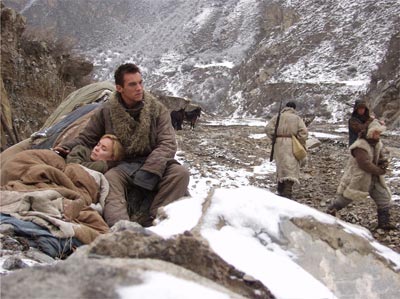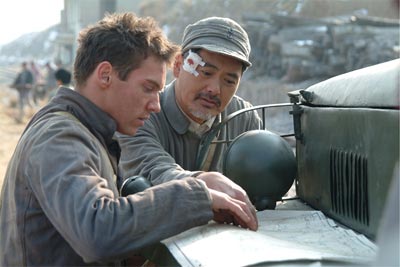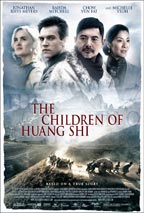Roger Spottiswoode The Children of Huang Shi Interview

ROGER SPOTTISWOODE HEADS TO CHINA
EXCLUSIVE The Children of Huang Shi Interview by Paul Fischer.Director Roger Spottiswoode is not averse to taking risks as a filmmaker from Shake Hands with the XDevil to the 1930s-set true story of The Children of Huang Shi. Inspired by true events, The Children Of Huang Shi tells how a young Englishman, George Hogg (Jonathan Rhys Meyers) came to lead sixty orphaned boys on an extraordinary journey of almost a thousand perilous miles across the snow-bound Liu Pan Shan mountains to safety on the edge of the Mongolian desert. And of how, in doing so, he came to understand the true meaning of courage. During his journey, Hogg learns to rely on the support of Chen (Chow Yun Fat), the leader of a Chinese partisan group who becomes his closest friend. He soon finds himself falling in love with Lee (Radha Mitchell), a recklessly brave Australian adventurer whom war has turned into an unsentimental nurse on horseback. Along the way Hogg befriends Madame Wang (Michelle Yeoh), an aristocratic survivor who has also been displaced by war, who helps the young Englishman, his friends and their sixty war orphans make their way across awesome (and rarely filmed) mountain and desert regions to a place of safety near the western end of the Great Wall of China. Shot on location, this China-Australia co-production was no mean feat as the director explained to Paul Fischer in this exclusive interview.
Paul Fischer: You don't pick easy subjects for your films what is it about this material that attracted you?
Roger Spottiswoode: Well, if you're going to spend a year of your life on a subject, to me it's much more interesting to find really good subjects and different subjects. And I like films to be different, not the same each time. There may be common themes, but I'd like to find different areas. And I did a film in Rwanda, and a film in China, in the same three-year period. But they're both fascinating people. And actually, they are slightly united in themes, about what can one - personal responsibility and courage. But this guy - you know, Hogg was, I thought, a remarkable guy. And he died at the age of 30. He went to China just to find out about it, and ended up learning Mandarin, and becoming completely involved, and becoming Chinese, in a way.
Paul Fischer: The Rwandan story had a degree of contemporary relevance, because that particular history was still very prevalent, I suppose, in the consciousness of the public. This story, of course, is relatively unknown to much of the world. Is that a challenge for you, to contemporize this piece, and even though it's a historical piece, to make it relevant?
 Roger Spottiswoode: Well, in a way, yeah. I guess it is a bit of a challenge. And it's set in a world that nobody really knows anything about. China, at that time, nobody knows very much. They don't really know much about China now. So that did make it more of a challenge. But it's a story of what one person can pull off, with determination and courage. And those things are always relevant. It's one person doing the impossible, or doing the very, very difficult.
Roger Spottiswoode: Well, in a way, yeah. I guess it is a bit of a challenge. And it's set in a world that nobody really knows anything about. China, at that time, nobody knows very much. They don't really know much about China now. So that did make it more of a challenge. But it's a story of what one person can pull off, with determination and courage. And those things are always relevant. It's one person doing the impossible, or doing the very, very difficult.Paul Fischer: And it's about a character who undergoes his own personal transformation. I mean, we don't see him as an initially sympathetic character.
Roger Spottiswoode: No, he isn't. He's busy trying to do something entirely different, and doesn't really give a shit about any of this, and then starts to wake up. Goes through a wake-up experience, and starts to change. And those are always - it's interesting to be reminded that people can change. It can do that. Not many of us do, but you can. He sure did. And he died at the age of 29 or 30. So, very, very young.
Paul Fischer: During the metamorphosis of this script, how much historical license did you take? Or is it pretty much as accurate as you'd be able to find it, based on the facts?
Roger Spottiswoode: Well, most of the events sort of happened. But there was much more, because it took longer. Whenever you cover a year of somebody's life, or a couple of years - you know, we just had to shorten it. We had to leave out an awful lot. I mean, even for Shake Hands With the Devil, we were looking at a period of time that was 200 days, and we had to lose an enormous amount of things - somebody's life in 200 days. So this story took longer. But many things happened, again. Hogg died later, but he didn't die the moment he arrived. He started building, again, and did. But they were all the same scenes that we'd already seen when he started. So for a film, it isn't very interesting to say, "Well, he does it all again."
Paul Fischer: Was it difficult for you to figure out what to cut?
Roger Spottiswoode: Yes, it's always hard. You want to put it all in. And then slowly - you've got a script that's 160 pages. And then you know that really, you have to be done at - you know, it's a two-hour film, and not a five-hour film. And that it's very hard to in movies, you can't really do the same thing again and again. Repetition doesn't do so well.
Paul Fischer: Obviously you shot, on location, in China. What were the particular problems that you faced shooting on location?
Roger Spottiswoode: Well, the Gobe Desert and those mountains are extremely difficult. The desert's particularly hard, because it's not - you know, you can sink into it. And we did. Our very first day of shooting, the road had been taken up since we were last there. And still in the dark, we were sent off on a short run that went across the actual desert. And within a quarter of a mile, 50 vehicles had sunk into the desert sand. And the crew just got out - a crew of three or 400 people. We all started collecting pebbles, and we built a little road to get us back together. It was quite astonishing. I think a Western crew, a European crew, would have probably been waiting to be dug out of there by cranes and things. And a Chinese crew just got on with it. And it was a real reminder that this is how China was built. Vast numbers of people just got on with it, and without complaint.
 Paul Fischer: So this earthquake must have come as a huge shock to you.
Paul Fischer: So this earthquake must have come as a huge shock to you.Roger Spottiswoode: Yes, it did. To us and them. But we're seeing some of the same things. A large number of people, some of them soldiers, and then volunteers, are there helping, and at an enormous level.
Paul Fischer: What about casting choices of this. I mean, Jonathan, who is an odd choice to play Henry the Eighth - what did you see in him that made you be convinced that this would be a right fit?
Roger Spottiswoode: Well, I liked him from Bend it Like Beckham, and from Match Point, two very different performances. And then when I met him, I thought he had a kind of youthful - not naiveté, but innocence and energy, and sort of a real sense that he could do things. And he had the right kind of approach to life that I thought was good for Hogg. And I thought from the two films that he really can act. And I'd seen him in a couple of other things, I think. So I thought he's very good. But his essential nature is right for this. And I think I was right about that. He does have this kind of exuberance. And - you know, he paces around the set. He likes to work all the time, you know? He's got all this energy. And he's exactly the same age, and he knows England, and he knows that kind of character.
Paul Fischer: What about Radha, who I think gives one of her best performances?
Roger Spottiswoode: Yeah, she is good. Well, she, too - I mean, I know she's from Australia, and I thought she had a little bit of a rural life, and could sit on a horse well, and is kind of a person who likes to get on with things, and does things. I had met this woman - I had met not the actual person, but a self-taught nurse-doctor who'd been in that war, and had a very direct strength to her. And I thought Radha had that. And they're very interesting characters, and I thought she could pull it off. I thought she did pull it off.
Paul Fischer: There are some extraordinary scenes with these children, particularly during the march, during the big walk. What were the challenges of working with these kids? And how hard was it to wrangle them?
Roger Spottiswoode: Well, we brought them teachers and trainers, and all of that. We had about 30 or 35 at the time. We found most of them - a few came from the Beijing Opera Schools, and they're very, very trained. Like, the guy who's the gardener. They're really trained performers. But the majority of them, the seven to 14-year-olds, are from the schools for undocumented workers. So they come from very tough lives, and they're sort of strong kids. Many of them have very sad faces, as you've probably seen. But they have a real sense of who they are. And I didn't want this just to be a crowd of kids that were kind of faceless Chinese, and they're just a crowd, and we didn't get to know them. Because although they don't all speak, you start to sort of see them as individuals, I think. And so we found, amongst these kids, these undocumented workers, we found very striking little personalities. And we put them together. And they came to the entire shoot. We didn't just sort of do six weeks with the kids. We had them for 15 weeks. And they were there pretty much every day. And - I mean, they would work with us every day. They were part of our crew, and it was really nice, because they're noise and brash and crazy. Then you ask them to be quiet, and they really are quiet. But they're very lively and disciplined at the same time.
Paul Fischer: Was this one of the toughest shoots you've undertaken?
Roger Spottiswoode: Yes, very much so. I wanted to do it with a Chinese crew, because I thought it would be more Chinese if it wasn't just a bunch of Westerners using a backdrop. But it is challenging to work entirely outside your language.
Paul Fischer: And this is an Australian-Chinese co-production, is that correct?
Roger Spottiswoode: Yes.
Paul Fischer: And so you got funding from both governments?
Roger Spottiswoode: We got funding from a Chinese distributor, with the blessing of the Chinese government. And we got a lot of funding from Australia. Some of it was government, and some of it was pre-sales, and things. An enormous amount of help from Australia. They were terrific. And, I mean, we had some Australians working on the film. But largely, hugely, the crew was Chinese. But the Australians were immensely helpful. We spent a lot of money there. We did the post there, and the post-post. They were great.
Paul Fischer: Would you want to shoot another film in Australia?
Roger Spottiswoode: Oh, in a second. I did. In fact, I'd love to shoot a real film in Australia. I shot a short film, which got itself - you're from Australia?
Paul Fischer: I am Australian, yeah.
Roger Spottiswoode: Yeah. I was in Melbourne, and they have the [INAUD] Short Film Festival. So - and I came across, when I was editing, there was a Spanish restaurant I used to go to. It was owned by a family, and the two sons played music and did flamenco several times a week. And they were really, really terrific. So my last day in Australia, I got a little crew together and we made a film. We shot a film. It opened the St Kilda Short Festival this year. I'd love to go back. Yeah, I really would. It's such an interesting place. I'd love to go and do a proper film there.
Paul Fischer: Do you know what you're doing next?
Roger Spottiswoode: I think I'm doing a William Golding novel called The Spire, set in the 14th century.
Paul Fischer: Oh, so another very easy film.
Roger Spottiswoode: Yeah, that's right. Yeah. I keep hoping for a drawing room comedy, you know?
Paul Fischer: I was going to say. You should be - like, a two-hander, like a Noel Coward -
Roger Spottiswoode: Set in Paris, with a very, very long shoot. Yeah. Work vigorously hard from 11 in the morning 'til seven in the afternoon. Yeah, that's exactly what I'm looking for. If you have a script in your hip pocket, send it over immediately. I'll do it first, in a second.
The Children of Huang Shi

MORE
- Viggo Mortensen The Road
- 24 Cast Reunion
- Aaron Eckhardt No Reservations
- Aaron Eckhart The Dark Knight
- Adam McKay Step Brothers Interview
- Alan Alda Diminished Capacity Interview
- Alan Alda Diminished Capacity Interview
- Alex Dimitriades
- Al Pacino Oceans 13
- Alan Rickman Snow Cake
- Alan Rickman Sweeney Todd



